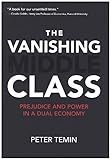The vanishing middle class : prejudice and power in a dual economy / Peter Temin.
Material type: TextPublisher: Cambridge, Massachusetts ; London, England : The MIT Press, [2017]Copyright date: ℗♭2017Description: xvii, 234 pages : illustrations ; 24 cmContent type:
TextPublisher: Cambridge, Massachusetts ; London, England : The MIT Press, [2017]Copyright date: ℗♭2017Description: xvii, 234 pages : illustrations ; 24 cmContent type: - text
- computer
- online resource
- 9780262036160 (hbk.)
- 9780262339988
- 0262339986
- 9780262339995
- 0262339994
- Since 2009
- Income distribution -- United States
- Middle class -- United States -- Economic conditions
- Minorities -- United States -- Economic conditions
- Equality -- United States
- Economic history
- Economic policy
- Equality
- Income distribution
- Middle class -- Economic conditions
- Minorities -- Economic conditions
- BUSINESS & ECONOMICS / Economics / Macroeconomics
- POLITICAL SCIENCE / Economic Conditions
- POLITICAL SCIENCE / Public Policy / Economic Policy
- United States -- Economic conditions -- 2009-
- United States -- Economic policy -- 2009-
- United States
- 339.2208900973 TEM 23 011924
- HC110.I5 T455 2017eb
| Item type | Current library | Call number | Status | Date due | Barcode |
|---|---|---|---|---|---|
 Book
Book
|
Indian Institute for Human Settlements, Bangalore | 339.2208900973 TEM 011924 (Browse shelf(Opens below)) | Available | 011924 |
Browsing Indian Institute for Human Settlements, Bangalore shelves Close shelf browser (Hides shelf browser)
| No cover image available No cover image available |

|

|

|

|

|

|
||
| 339.20968221 PIE 019465 Johannesburg : Confronting spatial inequality / | 339.22 ATK 007506 Inequality : | 339.22 SHI 014480 Oneness vs. the 1% : | 339.2208900973 TEM 011924 The vanishing middle class : | 339.22097253 MEN 012480 From rural poor to urban poor : | 339.220973 RYC 011815 The economics of inequality, discrimination, poverty, and mobility / | 339.230954 PRA 015820 Social accounting matrix for India : |
Includes bibliographical references and index.
Introduction -- A dual economy -- The FTE sector -- The low-wage sector -- Transition -- Race and gender -- The investment theory of politics -- Preferences of the very rich -- Concepts of government -- Mass incarceration -- Public education -- American cities -- Personal and national debts -- Comparisons -- Conclusions.
"The United States is becoming a nation of rich and poor, with few families in the middle. In this book, MIT economist Peter Temin offers an illuminating way to look at the vanishing middle class. Temin argues that American history and politics, particularly slavery and its aftermath, play an important part in the widening gap between rich and poor. Temin employs a well-known, simple model of a dual economy to examine the dynamics of the rich/poor divide in America, and outlines ways to work toward greater equality so that America will no longer have one economy for the rich and one for the poor. Many poorer Americans live in conditions resembling those of a developing country--substandard education, dilapidated housing, and few stable employment opportunities. And although almost half of black Americans are poor, most poor people are not black. Conservative white politicians still appeal to the racism of poor white voters to get support for policies that harm low-income people as a whole, casting recipients of social programs as the Other--black, Latino, not like "us." Politicians also use mass incarceration as a tool to keep black and Latino Americans from participating fully in society. Money goes to a vast entrenched prison system rather than to education. In the dual justice system, the rich pay fines and the poor go to jail." -- Publisher's description.


There are no comments on this title.